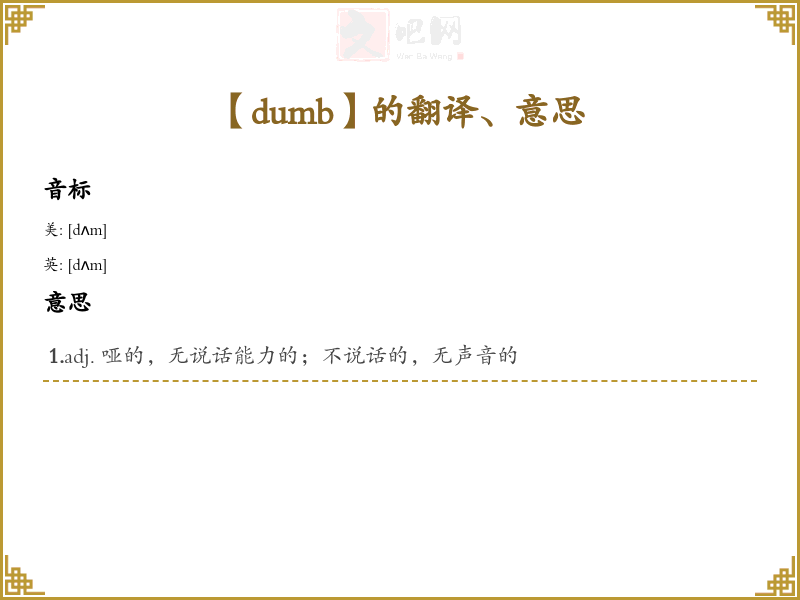【dumb】的翻译、意思
时间: 2025-03-07 10:11:43
【dumb】怎么读
美:[dʌm]
英:[dʌm]
【dumb】是什么意思、字义解释
1. adj. 哑的,无说话能力的;不说话的,无声音的
【dumb】的详细解释
英文单词学*与分析:[dumb]
1. 基本定义:
- 字面意思:该单词的字面含义是“无言的”或“无法说话的”,通常指因生理原因无法说话的人。
- 词性:形容词(adjective)。
2. 词源与起源:
- 词源分析:该词源自古英语“dumb”,原意为“无声的”或“沉默的”。其词根可以追溯到德语和日耳曼语,所有这些词的基本含义均与无声或沉默相关。
- 历史背景:在历史上,“dumb”一词曾被用于描述失语症患者,但随着社会对语言能力和沟通的理解加深,这个词的使用逐渐引发争议,尤其是作为贬义词。
3. 使用场景:
-
正式与非正式语境:
- 在正式场合中,“dumb”可用于描述某人因某种原因无法表达自己,如:"He was left dumb by the shocking news."(他被震惊的消息弄得无言以对。)
- 在非正式语境中,它常用于形容某人愚蠢,如:"That was a dumb mistake."(那是个愚蠢的错误。)
-
特殊场合:在法律或医学领域,"dumb"可能用于描述不能说话的患者,通常更倾向于使用“mute”来避免负面含义。
4. 示例句子:
- He is dumb in the sense that he cannot speak due to his condition.
他是无言的,因他的病症无法说话。 - Making dumb decisions can lead to serious consequences.
做出愚蠢的决定可能会导致严重后果。 - She felt dumb when she realized her mistake.
当她意识到自己的错误时,她感到很愚蠢。 - The movie was so dumb that I couldn't help but laugh.
这部电影太愚蠢了,我忍不住笑了。 - In ancient times, people who could not speak were often misunderstood as being dumb.
在古代,无法说话的人常常被误认为是愚笨的。
5. 同义词与反义词:
-
同义词:
- Mute:通常指不能说话的状态,更中性。
- Silent:意指保持沉默,通常不带贬义。
-
反义词:
- Talkative:形容人健谈的,表达能力强。
- Articulate:形容人表达清晰的,善于用语言。
. 学方法:
- 音标记忆法:/dʌm/,可以将其分解为“d” + “um”,联想到“哑巴”。
- 谐音联想记忆:将“dumb”联想成“当你愚蠢时,你就像‘噩梦’(dumb)一样”,利用音似词进行记忆。
7. 关联词汇:
- Dumbfound(使惊愕)
- Dumbbell(哑铃,常用于形容愚蠢的举动)
- Dumbwaiter(传菜电梯)
通过以上信息,可以更全面地理解和运用“dumb”这个词。
【dumb】例句
1、[ADJ] Someone who is dumb is completely unable to speak. 哑的
-
例:...a young deaf and dumb man.…一名年轻的聋哑人。
2、[[v-link ADJ]] If someone is dumb on a particular occasion, they cannot speak because they are angry, shocked, or surprised. 说不出话的
-
例:We were all struck dumb for a minute.我们一时个个都哑口无言。
3、[[非正式]] If you call a person dumb, you mean that they are stupid or foolish. 蠢的
-
例:The questions were set up to make her look dumb.这些问题是安排好让她显得蠢的。
4、[[非正式]] If you say that something is dumb, you think that it is silly and annoying. 愚蠢而恼人的
-
例:I came up with this dumb idea.我想出了这个愚蠢而恼人的主意。
